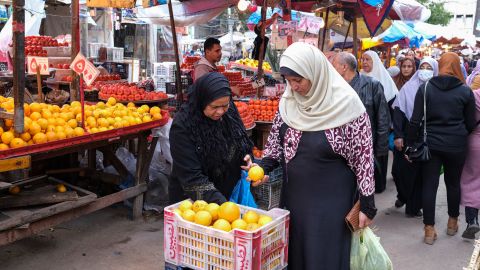Editor’s Note: A version of this story appears in today’s Meanwhile in the Middle East newsletter, CNN’s three-times-a-week look inside the region’s biggest stories. Sign up here.
Egypt has dug itself a massive hole of debt. On Friday, the International Monetary Fund (IMF) will extend a $3 billion loan to the country, a fourth aid package in six years, as its financial tailspin continues.
The loan, along with billions of dollars in cash inflows from Abu Dhabi and Riyadh, are Band-Aids, experts say, designed to keep the Arab world’s most populous country afloat. Without proper reforms, however, Egypt may never be able to shake off its chronic financial woes and break its growing debt addiction.
In recent months, the Egyptian pound has plummeted, losing 14.5% of its value against the US dollar in October. The prices of vegetables, dairy products and bread skyrocketed. Some families are restricting their diets as their purchasing power shrinks, while others struggle to find imported products once available at their local stores.
In a country with a long history of political tension and a fast-growing population – currently 104 million people – the repercussions of economic pain can be far-reaching. When millions of Egyptian protesters toppled former President Hosni Mubarak during the 2011 Arab Spring, “Bread, freedom and social justice” was among the most popular chants.
Egypt’s main Gulf Arab backers recognize what’s at stake here. Billions of dollars from Abu Dhabi and Riyadh have poured into the Egyptian economy in recent years. Both the United Arab Emirates and Saudi Arabia saw giant windfalls on the back of this year’s high oil prices. They’ve used some of that money to bolster the economies of their allies in the Middle East.
In August, Abu Dhabi Developmental Holding Company (ADQ), one of the emirate’s wealth funds, announced a number of investments in publicly listed companies in Egypt, “building on its long-term commitment to investing in the country’s economic growth through its $20 billion joint strategic investment platform,” it said in a statement.
Saudi Arabia’s Public Investment Fund (PIF) also launched the Saudi Egyptian Investment Company (SEIC) in August, a company dedicated to investments in several vital sectors of the Egyptian economy. SEIC has bought $1.3 billion dollars’ worth of shares in four Egyptian businesses.
Still, the Egyptian economy has struggled to shake off its economic woes. Inflation is at a five-year high, making food and other basic goods unaffordable to tens of millions of vulnerable Egyptians.
Kicking the can down the road
The North African state now owes more than $52 billion to multilateral institutions, at least 44.7% of which is owed to the IMF alone.
Its foreign debt “has more than tripled between June 2013 and March 2022, raising the external debt-to-GDP ratio from 15% to approximately more than 35%,” writes Stephan Roll, head of the Africa and Middle East Division at the German Institute for International and Security Affairs (SWP) in Berlin.
“And there is no end in sight,” he adds.

But how did Egypt get here? The problem, analysts say, lies in Egypt’s apparent inability to change the way its economy works, including easing the tight control exerted by the military and its many enterprises. This is a problem, the experts say, that stunts private sector competition and drives away investment.
Egypt has been on the path to debt-addiction for several years. In 2016, President Abdel Fattah al-Sisi sealed a deal with the IMF granting a $12 billion loan. The bailout was granted on condition of Egypt’s currency floating freely, which ultimately slashed its value by half in a matter of weeks and pushed up inflation. Harsh austerity measures – including cuts to subsidies on fuel and electricity – were enforced to try to restore government finances.
Despite the bailout, Egypt struggled to fully pick itself back up, with analysts attributing the repeated failures to revitalize the economy to loose agreements and the mismanagement of loans.
“Not only are they [loans] temporary Band-Aids, they’re not conditioned in a manner that would actually push for the reforms necessary to ever allow the Egyptian economy to recover,” said Timothy Kaldas, a policy fellow at the Tahrir Institute for Middle East Policy.
“Recently they [the multilateral lenders] seem to have started to finally notice that, and seem to want to see some of those reforms, but they haven’t successfully gotten the Egyptians to agree to them,” he added.
The cash-strapped country also spends much of its funds on luxury megaprojects that critics call “unnecessary” when other sectors seem to be in dire need of support, including education and health care. Data pertaining to state spending on these projects is not available to the public.
“Loans were not primarily used to improve the economic framework conditions but to protect the revenues and assets of the armed forces, to finance major projects in which the military could earn significant money, and to pursue an expansive military build-up,” Roll told CNN.
Authorities have repeatedly defended the state megaprojects, arguing that they improved infrastructure, transportation and telecommunications.
“These are projects that cannot be put to the side, as they are projects needed by the Egyptian citizen,” said Prime Minister Mostafa Madbouly in a May press conference. He blamed the Covid-19 pandemic and the effects of the Ukraine war for exacerbating Egypt’s financial problems.
Close to 30% of Egypt’s population is below the poverty line, authorities say. The World Bank in 2019 estimated that “some 60% of Egypt’s population is either poor or vulnerable,” highlighting a growing disparity between the rich and poor.
Authorities insist they are making progress. Sisi has repeatedly called on military-owned companies to be listed on the stock exchange, but few concrete steps have been taken to liberalize those enterprises.
In September 2019, brief and rare demonstrations broke out across Egypt, despite a strict ban on protests. They were driven primarily by economic grievances. Protesters also decried the military’s alleged influence over finances. Security forces quickly quelled the demonstrations and more than 4,000 people were arrested.
The digest
Irish soldier killed in south Lebanon by ‘hostile mob’
An Irish soldier on a peacekeeping mission in Lebanon was shot and killed on Wednesday when his UN convoy was attacked by a “hostile mob,” according to Irish Defense Minister Simon Coveney. Seán Rooney, 23, was shot and killed in the incident, and another Irish soldier was seriously injured.
- Background: The convoy was conducting a “standard administrative run” between southern Lebanon and Beirut, Coveney said. The group then came under small arms fire, social media footage showed. Lebanon’s Prime Minister-designate Najib Mikati has vowed to hold the culprits accountable. According to multiple official statements, the injured troops were taken to Raee Hospital, near the city of Sidon. Rooney was pronounced dead on arrival at the hospital.
- Why it matters: The United Nations has maintained a multinational peacekeeping mission in southern Lebanon since 1978, to bolster security in the tense border area between Lebanon and Israel. Irish peacekeepers have been in the country since the start of the mandate. According to Coveney, Rooney’s death was the first Irish fatality in the country in two decades. There are long-simmering tensions between the peacekeeping mission, known as UNIFIL, and locals in the region where Iran-backed Hezbollah dominates.
Iran expelled from UN women’s rights body
In an unprecedented move, UN member states on Wednesday voted to remove Iran from a UN women’s rights body for violating the rights of women and girls amid ongoing protests across the country.
- Background: Twenty-nine members of the UN’s Economic and Social Council voted in favor of the resolution to remove Iran from the Commission on the Status of Women, which was proposed by the United States. Eight member states voted against the resolution with 16 abstentions. Iran condemned the move, calling it an “illegal request” that weakens the rule of law in the UN.
- Why it matters: Iran had just started a four-year term on the 45-member Commission on the Status of Women, which aims to promote gender equality worldwide. Women in Iran have played a vital role in nationwide demonstrations that erupted in September, but have also allegedly been a target of state violence. Last month, CNN revealed covert testimonies by protesters documenting sexual assault and rape in Iranian detention centers.
Istanbul’s mayor sentenced to jail and faces possible political ban
Istanbul Mayor Ekrem Imamoglu – the most popular rival of Turkish President Recep Tayyip Erdogan – was sentenced to nearly three years in jail on Wednesday for insulting public officials. He could face a political ban if the conviction is upheld by an appeals court.
- Background: After the court convicted Imamoglu to two years, 7 months and 15 days in prison, his first response to the ruling was defiant. “A handful of people cannot take away the authority given by the will of the people,” the mayor said. “With God’s will, our struggle begins even stronger.” Imamoglu won a rerun election for Istanbul mayor in June 2019 after the first election was canceled due to irregularities.
- Why it matters: The decision could bar him from running in the 2023 presidential elections, where he would compete with Turkey’s long-time president. Thousands protested the ruling on Thursday, chanting slogans against Erdogan and his AK party, Reuters reported.
World Cup
Defending champion France ended Morocco’s 2022 World Cup dream on Wednesday after a 2-0 victory at the Al Bayt Stadium.
Theo Hernández scored on five minutes with an acrobatic finish, with substitute Randal Kolo Muani tapping home late on as France reached its fourth World Cup final just four years after winning in Russia.
But Morocco, the first African team to reach the semifinal stage of the World Cup, can go home with its head held high after running France close before Kolo Muani’s decisive strike.
Having captured the hearts and minds of the footballing world, it was a sad end to Morocco’s aspirations. But it gave reigning champion France a run for its money. Morocco leaves the competition knowing it has achieved more than just success on the pitch.
Read more:
- A Kenyan security guard who reportedly fell while on duty at Qatar’s Lusail Stadium has died in hospital, his family and officials have confirmed to CNN. His employer had notified the migrant worker’s family on Saturday that 24-year-old John Njau Kibue had fallen from the 8th floor of the stadium while on duty. His sister Ann Wanjiru told CNN: “We don’t have the money to get justice for him, but we want to know what happened.”
Photo of the day

from WordPress https://ift.tt/ZPGH9TA
via IFTTT